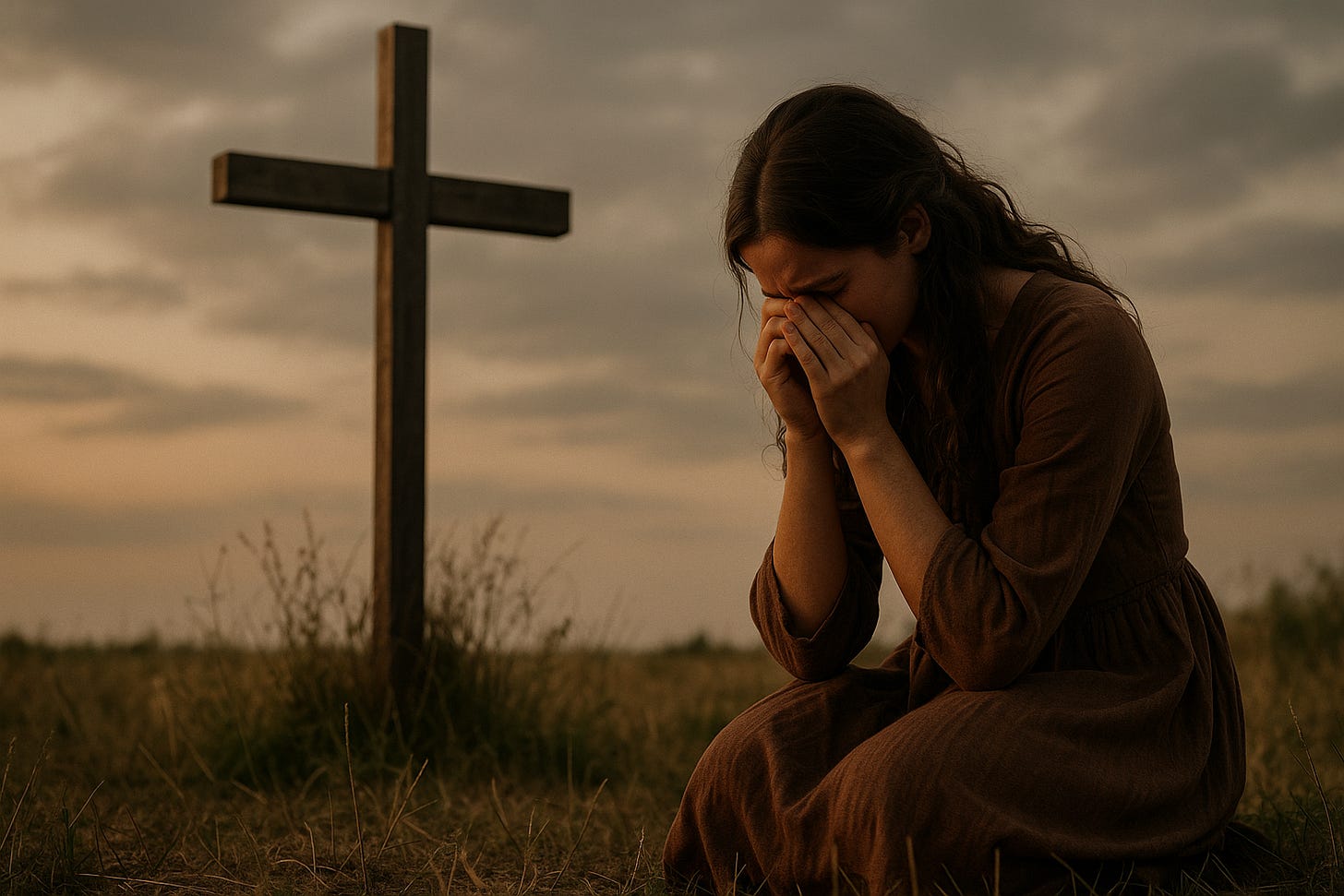Return to me with all your heart
Joel 2:12-13 - God is “slow to anger and abounding in love”, and will spare us from what we truly deserve if we turn back to Him.
This image was created using DALL·E, OpenAI’s legacy image generation model.
““Even now,” declares the Lord, “return to me with all your heart, with fasting and weeping and mourning. Rend your heart and not your garments. Return to the Lord your God, for he is gracious and compassionate, slow to anger and abounding in love, and he relents from sending calamity.””
Joel 2:12-13 NIV
A quick search of all of the Heaven On Wheels devotionals up to this point (1,236 as of June 14, 2025) shows that although we’ve referred to the minor prophet Joel a few times, we’ve never explored any of his prophecies. Today that changes with a look at two verses from the Book of Joel.
This is a Jewish prophetic text that contains divine announcements — words spoken to Joel by God, then captured by the prophet for posterity and teaching in verbal and written form. Elsewhere in this short (three chapter) book, Joel prophesies that God’s Holy Spirit will be poured out on all people (Joel 2:28). The Apostle Peter quotes the prophesy of Joel on the day of Pentecost (Acts 2:16-21), so despite being a minor prophet, Joel played a major part in making the Holy Spirit known to the Jews of the pre-Messiah times.
Historically, there is no agreement on when the prophet Joel lived and made his pronouncements. Some scholars believe he could have lived as early as the 9th century BC, but more evidence seems to point to a few decades right around 400 BC. Since we may not hear from Joel frequently in the future, here’s a synopsis of what the book is all about…
Chapter 1 laments a great plague of locusts, a severe drought, and the effects of these events on farmers and on the supply of food offerings for the Temple in Jerusalem. Beginning with Chapter 2, there’s an apocalyptic passage (Joel 2:1-10) that compares the locusts to a ravaging army, and in Joel 2:11, it is revealed that they are God’s army.
A plague of locusts. This image was created using DALL·E, OpenAI’s legacy image generation model.
Today’s verses are at the beginning of a call for the nation of Judah to repent (Joel 2:12-17), as it is on the receiving end of God’s judgement. What will be God’s merciful response to a penitent nation? The locusts will be banished, and crops restored to their former abundance (Joel 2:18-27). God offers more rewards for penitence: prophetic gifts, the Holy Spirit, and safety of His people in cataclysmic times (Joel 2:28-32). The book ends in Chapter 3 with a prophesy of judgement coming down on the enemies of Judah — the Philistines, Edomites, and Egyptians.
With that CliffsNotes version of the Book of Joel out of the way, let’s look more closely at today’s verses. The Lord begins in Joel 2:12 with a call for true repentance — “return to me with all your heart, with fasting and weeping and mourning. Rend your heart and not your garments.”
Enduring Word’s David Guzik says this about the verse in his commentary:
Because they heard the warning of judgment, God’s people should repent. It’s doesn’t make their repentance less valid because they had to be scared into it. The important thing is that they turn back to the LORD in sincerity, and God tells them how.
i. Sincere repentance is to turn to God, and therefore away from our sin.
ii. Sincere repentance is done with all your heart, giving everything you can in surrender to God.
iii. Sincere repentance is marked by action (with fasting) and emotion (with weeping… mourning). Not every act of repentance will include fasting and weeping, but if action and emotion are absent, it isn’t real repentance.
So why does God tell them to “Rend your heart and not your garments” in Joel 2:13? God does not want an outward show of repentance; He wants true repentance. Today we might see someone who feels that they need to repent making a large offering of money to their church or a charity. It’s a nice gesture, but if they aren’t feeling truly sorry about their sin and making a change in their life to avoid sinning in the future, it’s rather futile — rather like rending your garments was in Joel’s time.
The great preacher Charles H. Spurgeon relates this story in the Enduring Word commentary:
i. Spurgeon tells the story of a woman who came seeming to be in great sorrow, saying what a great sinner she was, but Spurgeon suspected her repentance wasn’t sincere. He said, “Well, if you are a sinner of course you have broken God’s laws. Let’s read the Ten Commandments and see which ones you have broken.” They started at the first: “You shall have no other gods before Me,” and Spurgeon asked her if she ever broke that commandment. “Oh no,” she said, “not that I know of.” “‘You shall not make any graven image’ — did you ever break that one?” “Never, sir,” she answered. As you might suppose, Spurgeon went through all Ten Commandments and she could not find a single one that she had broken, and what he suspected was true. She didn’t really consider herself a sinner, and she was making a show of repentance because she thought it was expected of her.
The remainder of Joel 2:13 repeats the call to repentance: “Return to the Lord your God, for he is gracious and compassionate, slow to anger and abounding in love, and he relents from sending calamity.” We should never turn away from repenting of our sins as believers, as we know that God is always good and always merciful. God is “slow to anger and abounding in love”, and will spare us from what we truly deserve if we turn back to Him.
Heaven On Wheels Daily Prayer:
Heavenly Father, with humble hearts we come before You, torn not just in word but in spirit. You call us to return—not with outward show, but with true repentance. Thank You for being gracious and compassionate, slow to anger and abounding in love. Help us to turn from our sin and back to Your mercy. Cleanse us, Lord, and draw us near once again. In Jesus’ name, AMEN.




